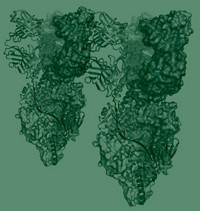Advertisement
Grab your lab coat. Let's get started
Welcome!
Welcome!
Create an account below to get 6 C&EN articles per month, receive newsletters and more - all free.
It seems this is your first time logging in online. Please enter the following information to continue.
As an ACS member you automatically get access to this site. All we need is few more details to create your reading experience.
Not you? Sign in with a different account.
Not you? Sign in with a different account.
ERROR 1
ERROR 1
ERROR 2
ERROR 2
ERROR 2
ERROR 2
ERROR 2
Password and Confirm password must match.
If you have an ACS member number, please enter it here so we can link this account to your membership. (optional)
ERROR 2
ACS values your privacy. By submitting your information, you are gaining access to C&EN and subscribing to our weekly newsletter. We use the information you provide to make your reading experience better, and we will never sell your data to third party members.
Biological Chemistry
Alexander Rich Wins Welch Award
MIT professor is honored for his lifelong work on DNA and RNA
by Linda Wang
May 13, 2008
For his pioneering work on nucleic acids, Alexander Rich, a professor of biophysics at MIT, has won the 2008 Welch Award in Chemistry. The $300,000 award is given annually by Houston's Welch Foundation to foster and encourage basic chemical research that benefits humankind.
A student of Linus Pauling's and a contemporary of James Watson and Francis Crick, Rich has devoted his entire career to studying DNA and RNA. In 1979, he and his colleagues discovered left-handed DNA, which they named Z-DNA for its zigzag backbone. Since then, Rich's research has focused on Z-DNA's importance in biological systems.
In addition, Rich discovered and solved the three-dimensional structure of the RNA double helix. He was the first scientist to carry out DNA-RNA hybridization and to discover DNA's presence in organelles. He also discovered polyribosomes, which are a cluster of ribosomes attached to mRNA; determined the three-dimensional structure of tRNA; and revealed a novel mechanism in viral diseases such as smallpox.
Rich is known for his enthusiasm for science. "When I called him up to tell him about the award, I couldn't get around to telling him because he was so eager to tell me about some new results he had found in his laboratory," says James L. Kinsey, chairman of the Welch Scientific Advisory Board.
At age 83, Rich is still active in research. One of his goals is to develop a small-molecule drug to block a Z-DNA binding protein from exerting its role in pox virus pathogenesis, potentially treating smallpox and combating bioterrorism. "It is very satisfying to see the Z-DNA discovery made so long ago now playing an important role in biological systems." he says.
Rich's former students say he is also a great teacher. "He gives his students and colleagues a great deal of freedom in carrying out their research in his laboratory," says Andrew H.-J. Wang, who codiscovered Z-DNA in 1979 and is now vice president of Academia Sinica in Taiwan. "He provides an interdisciplinary research environment where interesting ideas can emerge from any corner."






Join the conversation
Contact the reporter
Submit a Letter to the Editor for publication
Engage with us on Twitter